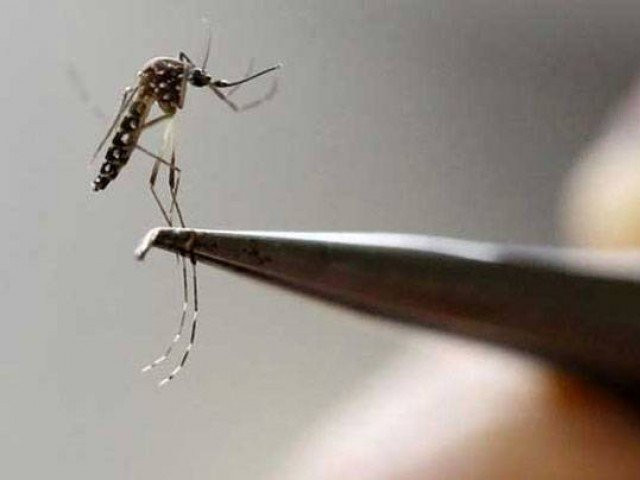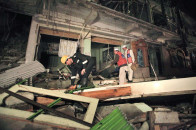In twin cities: Suspected dengue cases soar above 700
National Institute of Health issues seasonal communicable disease alert

PHOTO: AFP
While dengue cases are on the decline in the twin cities of Islamabad and Rawalpindi owing to the onset of winter, the national health body has issued a seasonal illness alert.
As many as 734 suspected dengue patients have been admitted and treated at hospitals in Rawalpindi so far this year. Of these, 377 have been reported from Rawalpindi district.
Within the garrison city, areas falling within the Rawalpindi Cantonment Board (RCB) and Potohar Town have seen the most cases reported including 74 from RCB areas, 68 from Potohar Town, 56 from Rawal Town and 16 from the Chaklala Cantonment Board.
Outlying areas of Rawalpindi division, including Taxila, Gujjar Khan and Chakwal have contributed around a third of the cases including 100 from Chakwal, 22 from Taxila and 14 from Gujjar Khan.
Around 357 cases have been reported from neighbouring Islamabad.
Plan for next year
Meanwhile, Rawalpindi Deputy Commissioner Dr Jahangir has issued directives to draft a ‘winter plan’ and a dengue season plan which aims to fully control incidence of dengue in the region next year.
The ‘winter plan’, demanded within two weeks, will commence on November 20 every year after the dengue campaign comes to an end and special teams will work through the three winter months until February 28, 2019, spraying all places where dengue larva was found or is suspected to breed in.
Moreover, areas, where a majority of the dengue patients originated, will also be canvassed by these special teams.
Moreover, all the places where the teams find standing water will be sprayed.
The aim is that once spring comes around, the germination of dengue mosquito larvae can be curbed in the twin cities.
From March 1, 2019, a full-fledged anti-dengue campaign will be launched. In this regard, the district administration will procure the chemical used in sprays, spray pumps, and medicines in February.
NIH advisory
The National Institute of Health (NIH) in Islamabad on Friday issued a seasonal awareness and alert letter (SAAL) for epidemic-prone infectious diseases.
The letter has been developed for the winter season from October to February. The main purpose of SAAL is to alert all health authorities and professionals and to facilitate the timely and efficient response to the outbreaks and epidemics and help to reduce the associated morbidity and mortality.
The NIH has detailed patterns of high priority communicable diseases including dengue, Chikungunya, Crimean-Congo Haemorrhagic Fever (CCHF), diphtheria, measles, seasonal influenza, polio and pertussis.
The letter also contains a detailed introduction of diseases, case definitions, infectious agents, modes of transmission, case management and prevention.
Further, the letter contains information on health events such as outbreaks of Typhoid Fever (extensively drug resistance strain) as national health events. Ebola virus disease, Zika virus disease, Middle East Respiratory Syndrome Coronavirus (MERS CoV) and Yellow Fever considered as international events during the ongoing winter season.
Through SAAL, the NIH suggests that provincial and district health departments, including in the Islamabad Capital Territory (ICT), as well as other stakeholders, take pre-emptive measures against the priority diseases.
NIH also advised to keep a continuous watch on the anticipated seasonal public health threats and taking all preventive or curative measures in this context.
To facilitate the stakeholders, the requisite technical guidelines and awareness material along with SAALs are available on the NIH’s website (www.nih.org.pk).
Published in The Express Tribune, November 10th, 2018.



















COMMENTS
Comments are moderated and generally will be posted if they are on-topic and not abusive.
For more information, please see our Comments FAQ